by Office Manager | Apr 3, 2017 | People Who Inspire Us, Women's History
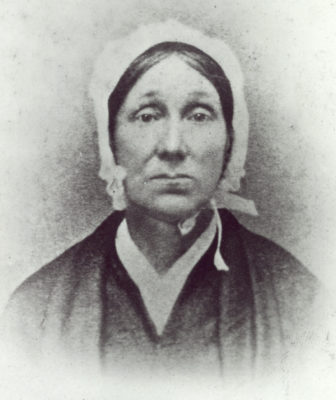
Sarah Righter Major
“Sarah Righter Major was entirely out of place among the Brethren and yet remained entirely in her place. And that is how she became the first, and, for decades, the only woman preacher in the fraternity. Sarah was born August 29, 1808 near Philadelphia, Pennsylvania. When she was eighteen, she heard Harriet Livermore preach, and the event changed her life. Miss Livermore was a well-known preacher whom the more progressive Philadelphia area Brethren sometimes allowed to preach, something Brethren in the rural areas would have been much less likely to permit.
Apparently, Harriet Livermore did more than convert young Sarah. She also set a provocative example, for shortly after Sarah joined the church, she herself felt called to preach. She knew how the Brethren felt about women preachers. They took Paul’s admonition in 1 Corinthians 14.34-35 very seriously: “Let your women keep silence in the churches: for it is not permitted unto them to speak; but they are commanded to be under obedience, as also saith the law. And if they will learn anything, let them ask their husbands at home: for it is a shame for women to speak in the church.” (KJV) (more…)
by Office Manager | Mar 22, 2017 | People Who Inspire Us, Women's History
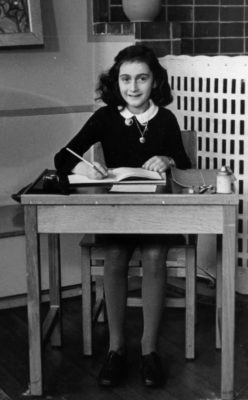 The story of Anne Frank and her family could have gone untold, just like countless stories of Jewish families during World War II. Instead, because of Anne’s diary, she has touched the hearts of millions of people all over the world. Anne and her family were Jews living in Germany until Hitler’s rise to power and growing anti-semitism made them feel it was necessary to move to the Netherlands. Once the Nazis invaded the Netherlands, it was not long before the family made the decision to go into hiding. They hid in the rear annex of the building housing Otto Frank’s business. For more than two years, Anne’s family lived with a few other refugees in the tiny space dubbed the “Secret Annex” while friends of the family assisted in smuggling food and supplies to them, all while business continued in the building below. During this time, Anne poured her heart out to a diary. When the family was betrayed and discovered by the Nazis in 1944, Anne was sent to Bergen-Belsen concentration camp, where she died of Typhus in 1945. Her diary, however, was rescued by one of the family’s “helpers,” Miep Gies. After the war, Miep returned the diary to Otto Frank, who published the writings so that the world could understand the ravages of war, the pain of families torn apart, and lost dreams of little children. Today, The Diary of a Young Girl has been published in close to 70 languages.
The story of Anne Frank and her family could have gone untold, just like countless stories of Jewish families during World War II. Instead, because of Anne’s diary, she has touched the hearts of millions of people all over the world. Anne and her family were Jews living in Germany until Hitler’s rise to power and growing anti-semitism made them feel it was necessary to move to the Netherlands. Once the Nazis invaded the Netherlands, it was not long before the family made the decision to go into hiding. They hid in the rear annex of the building housing Otto Frank’s business. For more than two years, Anne’s family lived with a few other refugees in the tiny space dubbed the “Secret Annex” while friends of the family assisted in smuggling food and supplies to them, all while business continued in the building below. During this time, Anne poured her heart out to a diary. When the family was betrayed and discovered by the Nazis in 1944, Anne was sent to Bergen-Belsen concentration camp, where she died of Typhus in 1945. Her diary, however, was rescued by one of the family’s “helpers,” Miep Gies. After the war, Miep returned the diary to Otto Frank, who published the writings so that the world could understand the ravages of war, the pain of families torn apart, and lost dreams of little children. Today, The Diary of a Young Girl has been published in close to 70 languages.
(more…)
by Office Manager | Mar 15, 2017 | People Who Inspire Us, Women's History
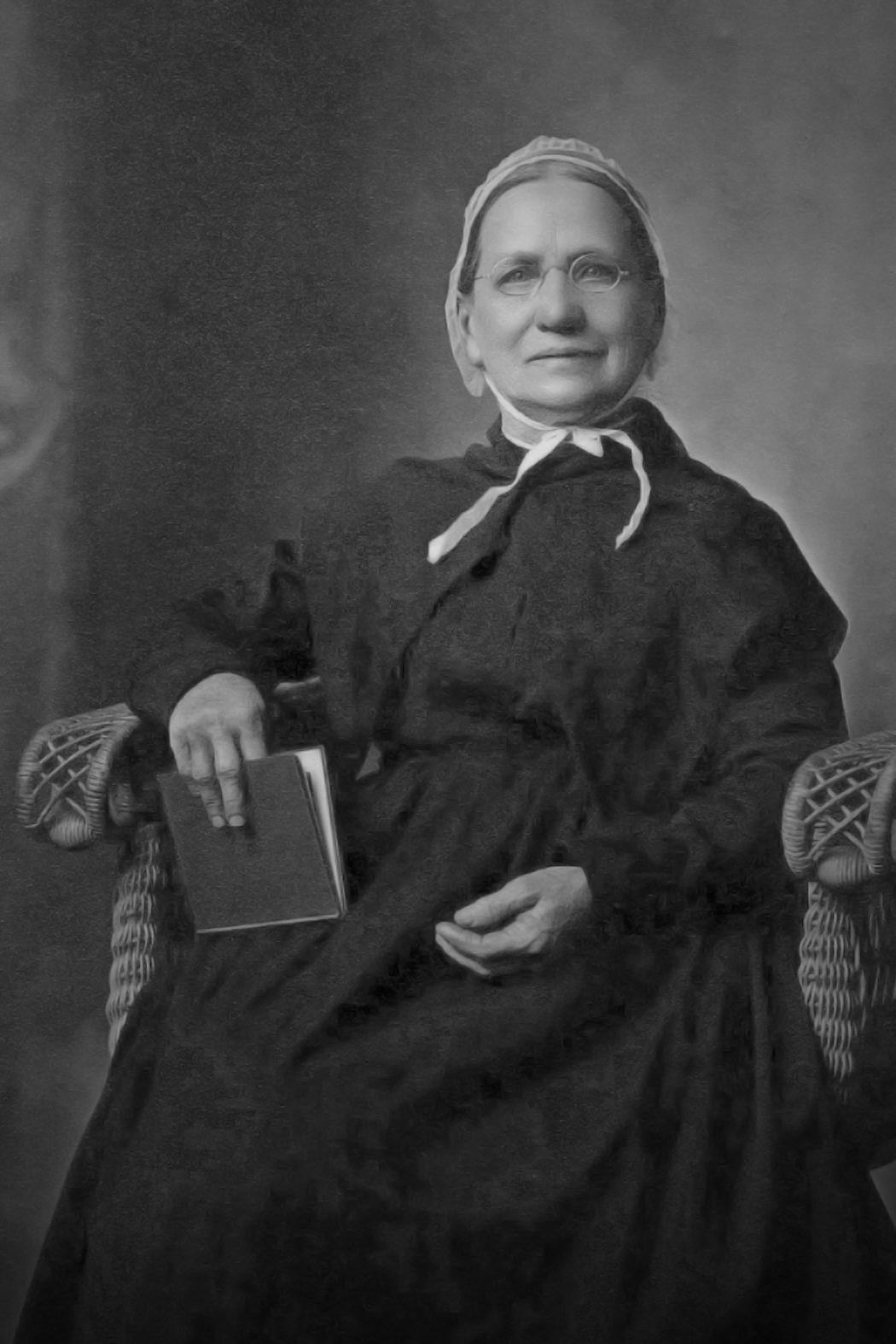
Julia A. Gilbert
Julia Gilbert was baptized at the age of 14. That’s when the trouble started. Of course, this depends on your perspective. Gilbert lived during a time in the Church of the Brethren that kept men and women separate during rituals such as footwashing. Additionally, the sisters were denied the privilege of breaking bread and passing the cup of communion among themselves. A [male] church elder would break the bread for them. It is speculated that this was done to symbolize the headship of man over woman. Or perhaps, as Pamela Brubaker notes in a chapter of Church of the Brethren: Yesterday and Today, “a change was made so that the administrator could be sure that women whose heads were not properly covered would not be able to receive communion, thus assuring their obedience to church authority.”
Whatever the reason, Julia found this practice frustrating due to her diligent study of scripture and her concern that that the practice of the church be faithful to biblical teachings. That led her to believe that women should be allowed to break bread for each other during communion following the example of Christ. “In 1883 she wrote a letter to the Gospel Messenger asking if those who taught that women were subordinate under the law and gospel and therefore should not break bread with each other would please instruct the sisters what to do during feetwashing and the salutation of the holy kiss.”
Queries requesting that the privilege of breaking bread and passing the cup be granted to sisters came regularly to Annual Meetings beginning in 1899. The queries were coming from Grundy County (Iowa), and they were written by Julia Gilbert. Brubaker explains “About this time claims were again made that the sisters had broken bread for each other in the early days of the church. Drawing on historical material from the library of Abraham Harley Cassel, historian Martin G. Brumbaugh concluded: ‘Enough has been recorded to show that (more…)
by Office Manager | Mar 10, 2017 | People Who Inspire Us, Women's History
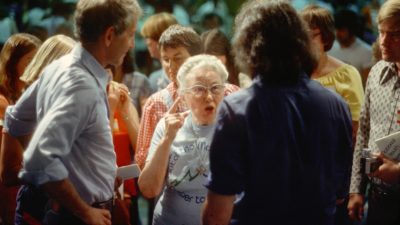 “…forgiving love is tender, but not soft. It is honest but never merciless. It brings eternal hope, never retribution.”
“…forgiving love is tender, but not soft. It is honest but never merciless. It brings eternal hope, never retribution.”
“It is easier to forgive others than it is to forgive ourselves. While we are in the process of being honest with ourselves we often become overwhelmed by the gulf between what we are and what we out to be…We must not get lost in making comparisons with past experiences…”
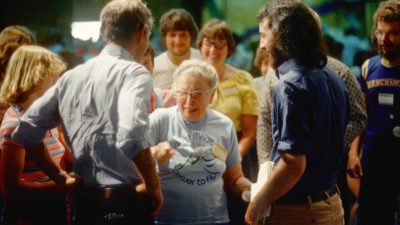 So writes Anna Mow in Say Yes to Life (1970, Zondervan Publishing House). Anna Mow served the Church of the Brethren as a missionary to India, author, speaker, and eventually as an ordained minister. Anna continues, suggesting that we remind ourselves “I am not yet perfect, I am in the process. I will not waste any energy kicking myself.’ It is pride that taunts me by saying, ‘After all this time, haven’t you grown more than this?’ But Christ says with loving encouragement, ‘You are growing. That is the reason you can see more things in your life that are not perfect. Let my grace continue to work, to cleanse and strengthen you.”
So writes Anna Mow in Say Yes to Life (1970, Zondervan Publishing House). Anna Mow served the Church of the Brethren as a missionary to India, author, speaker, and eventually as an ordained minister. Anna continues, suggesting that we remind ourselves “I am not yet perfect, I am in the process. I will not waste any energy kicking myself.’ It is pride that taunts me by saying, ‘After all this time, haven’t you grown more than this?’ But Christ says with loving encouragement, ‘You are growing. That is the reason you can see more things in your life that are not perfect. Let my grace continue to work, to cleanse and strengthen you.”
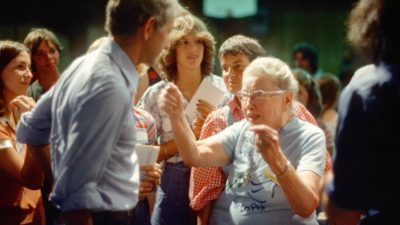 “When pride accuses, the sense of guilt which follows is debilitating until it is recognized for what it is. When pride accuses, the guilt is general; when God reveals, it is specific. A trained conscience under the guidance of the Spirit is a moral and spiritual agency serving our growth. In the light of His love the recognition of failure is always accompanied with the forgiveness of His love.
“When pride accuses, the sense of guilt which follows is debilitating until it is recognized for what it is. When pride accuses, the guilt is general; when God reveals, it is specific. A trained conscience under the guidance of the Spirit is a moral and spiritual agency serving our growth. In the light of His love the recognition of failure is always accompanied with the forgiveness of His love.
This forgiving love is tender, but not soft. It is honest but never merciless. It brings eternal hope, never retribution… It is the great “now,” always a new beginning, unfettered by the past, set free to be God’s child. Growth means constant renewal of life, which means we are always on the edge of new creation.”
by Office Manager | Mar 7, 2017 | Women's History
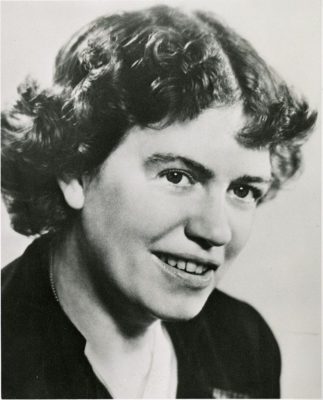
“Prayer does not use up artificial energy, doesn’t burn up any fossil fuel, doesn’t pollute. Neither does song, neither does love, neither does the dance.”
“To cherish the life of the world.” This is a phrase that defines the life and work of Margaret Mead. In fact, it is inscribed on her grave stone in Buckingham, PA. Born in 1901 into a family of social scientists and Quakers, Mead found the Episcopal Church at a young age, and was deeply involved throughout her life. Mead is best known for her work as a ground-breaking anthropologist. She received a Bachelor’s from Barnard College in 1923 and a Master’s from Columbia in 1924. Her first field study was of adolescent girls in Samoa in 1925. She went on to study three cultures in the western Pacific that were considered “primitive.” Her book, Sex and Temperament in Three Primitive Societies, was initially hailed by feminists for its theory that a person’s temperament was not determined solely by sex, but mostly by the expectations that society placed on that person’s sex. This was a revolutionary theory in Western scholarship.
(more…)
by Office Manager | Mar 6, 2017 | People Who Inspire Us, Women's History
“It is not the intelligent woman v. the ignorant woman; nor the white woman v. the black, the brown, and the red, it is not even the cause of woman v. man. Nay, tis woman’s strongest vindication for speaking that the world needs to hear her voice.”
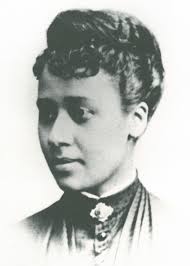
Anna Julia Cooper is regarded as one of the most noted African American intellectuals in history. However, her name is not as popularly known as her male counterparts of the same era such as Booker T. Washington and Frederick Douglass. Her life is one of perseverance, determination, and triumph over adversity. One can only imagine that she must have been tenacious and dedicated to her principles. She was born in 1858 to an enslaved mother and her white slaveholder. She spent her life educating black youth and advocating for black women. Cooper was the fourth African American to earn a Ph.D. – and did it all while raising five children that she adopted after her brother died. The Anna Julia Cooper Center at Wake Forest University gives a summary of her biography:
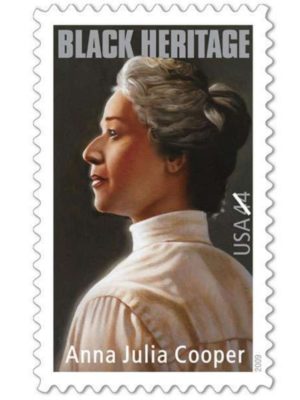
US Postal Service 2008
“…Anna Julia Cooper spent her lifetime of over a century redefining the limitations and opportunities for women of color in a society set up for their disempowerment and subjugation. A distinguished scholar and educator, Cooper saw the status and agency of black women as central to the equality and progress of the nation. (more…)








